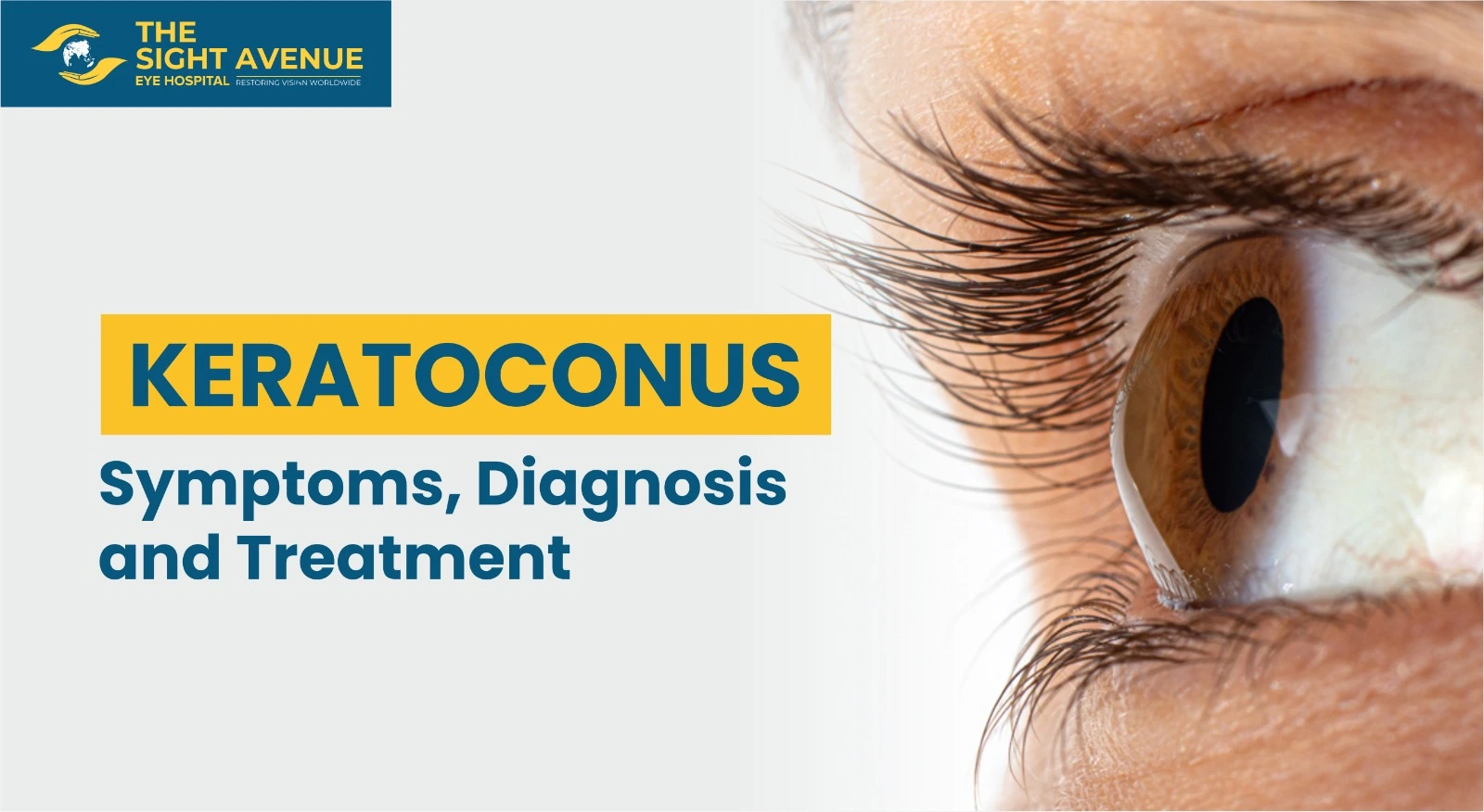Keratoconus: Symptoms, Diagnosis and Treatment

Keratoconus is an eye disease which usually affects the shape and clarity of the cornea and causes distorted vision. This is a rare condition, but it still affects 1 in 2000 people all over the world. Keratoconus can cause blurry and distorted vision, which makes it difficult to complete daily tasks like reading and driving. If you have been wondering how to control keratoconus, it’s symptoms, diagnosis and treatment, then this blog can provide relevant information on keratoconus .
What is Keratoconus?
The cornea is the clear, central part of the front surface of the eye, responsible for protecting the eye and helping focus light for clear vision. Keratoconus is a condition where the normally rounded cornea bulges outward into a cone shape. This deformity affects the cornea's ability to focus light into the retina, which causes blurred and distorted vision.
Understanding the Cornea's Role
In a healthy eye, the cornea maintains a dome-like shape, which is crucial for refracting light correctly. When keratoconus develops, this shape changes, resulting in irregular astigmatism and myopia (nearsightedness). This transformation can make simple tasks like reading, driving, or recognizing faces challenging.
Know More: How To Remove Spectacles Permanently
How Does Keratoconus Affect Vision?
Keratoconus affects vision in two primary ways:
- Irregular Astigmatism: The warping of the cornea causes irregular astigmatism, where glasses cannot fully correct the distorted vision.
- Increased Nearsightedness: As the cornea steepens, the eye becomes more nearsighted, necessitating frequent updates to eyeglass prescriptions.
Prevalence of Keratoconus
Keratoconus is relatively rare, affecting approximately 50 to 200 individuals per 100,000 people. It often begins in the teenage years or early twenties but can also start in childhood or later adulthood. The condition usually progresses slowly but can accelerate rapidly in younger individuals.
Symptoms of Keratoconus
Identifying the symptoms of keratoconus early can help manage the condition more effectively. Common symptoms include:
- Gradual Vision Deterioration: Vision in one or both eyes worsens over time.
- Double Vision: Experiencing double vision when looking through one eye.
- Halos Around Lights: Seeing halos around bright lights.
- Light Sensitivity: Increased sensitivity to light, known as photophobia.
- Distorted Vision: Straight lines appear wavy or bent, and objects may not have their correct shape.
- Blurry Images and Loss of Sharpness: This condition reduces image clarity and sharpness.
Know More: Know About Corneal Blindness
Causes and Risk Factors
The exact cause of keratoconus is largely unknown. However, some studies suggest a genetic component, as it tends to run in families. Additionally, certain medical conditions and behaviors, such as chronic eye inflammation and eye rubbing, may accelerate its development.

Associated Conditions
Keratoconus has been linked to various conditions, including:
- Atopic Dermatitis and Allergic Dermatitis
- Allergic Rhinitis
- Asthma
- Down Syndrome
- Ehlers-Danlos Syndrome
- Osteogenesis Imperfecta
- Congenital Eye Disorders
Diagnosing Keratoconus
Diagnosis of keratoconus involves a thorough eye examination and several specialized tests. Your eye care provider will review your medical and family history and discuss your symptoms before conducting these tests:
- Visual Acuity Test: Measures how well you can see at various distances using an eye chart.
- Slit Lamp Examination: Uses a bright light and microscope to examine the cornea.
- Keratometry: Measures the curvature of the cornea.
- Corneal Mapping (Tomography and Topography): Creates a detailed map of the cornea's surface, highlighting any abnormalities.
Treatment Options for Keratoconus
Several treatment options are available for keratoconus, depending on the severity of the condition. These treatments aim to improve vision and prevent further deterioration of the cornea.
1. Eyeglasses and Contact Lenses
In the early stages, vision can be corrected with eyeglasses or soft contact lenses. As the condition progresses, rigid gas-permeable contact lenses or other specialized lenses may be necessary to correct vision.
2. Corneal Cross-Linking
Corneal cross-linking is a minimally invasive procedure that uses ultraviolet (UV) light and riboflavin (vitamin B2) drops to strengthen the corneal tissue. This treatment can halt the progression of keratoconus and stabilize the cornea's shape.
3. Implantable Ring Segments (INTACS)
INTACS are small, crescent-shaped devices inserted into the cornea to flatten its shape and improve vision. This procedure is performed under local anesthesia and can make it easier to fit contact lenses.
4. Cornea Transplant
In advanced cases of keratoconus, a cornea transplant may be necessary. This surgical procedure replaces the diseased cornea with healthy donor tissue. While vision usually improves significantly, it may take a year or more for full stabilization, and some patients may still need corrective lenses.
For further information about keratoconus treatment, feel free to contact best eye specialist at The Sight Avenue Hospital.
Know More:Advantages of ICL
Conclusion
Keratoconus is a challenging condition that can significantly impact vision and quality of life. Early diagnosis and appropriate treatment are crucial for managing the condition effectively. Whether through eyeglasses, contact lenses, corneal cross-linking, or surgical interventions, there are several options to help maintain and improve vision for those with keratoconus.
Regular eye check-ups and consultations with The Sight Avenue’s best eye hospital in Gurgaon, can help detect keratoconus early and determine the best course of treatment. By staying informed and proactive, individuals with keratoconus can navigate the challenges of this condition and maintain a better quality of life.
Eye problems? Searching for an eye specialist near me in Delhi NCR? The Sight Avenue has 5 eye clinics in Delhi NCR. Contact us today!
Eye Hospital in Delhi
- The Sight Avenue
- The Sight Avenue
- The Sight Avenue
E-82-A, Ground Floor, Hansraj Gupta Rd, Greater Kailash I, New Delhi, Delhi 110048
Email:enquiry@thesightavenue.com
Tel : 011-4666 0666
Mob : +91-8883330799
Fortis Hospital, Escorts Okhla, New Delhi
Fortis Hospital, Vasant Kunj, New Delhi





